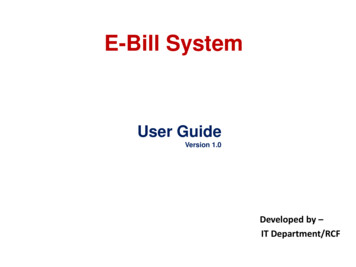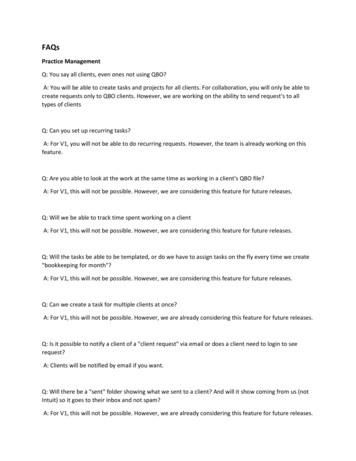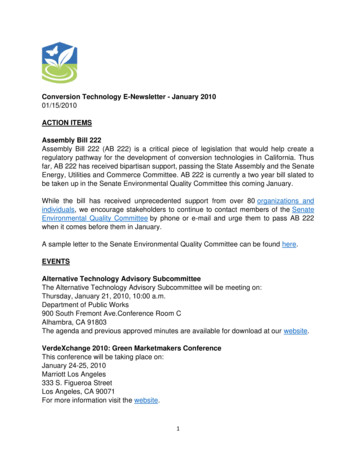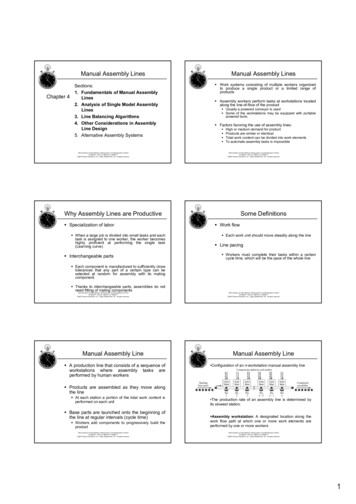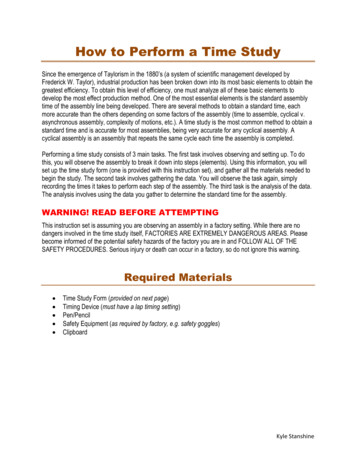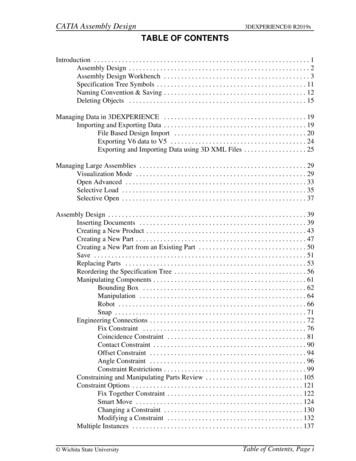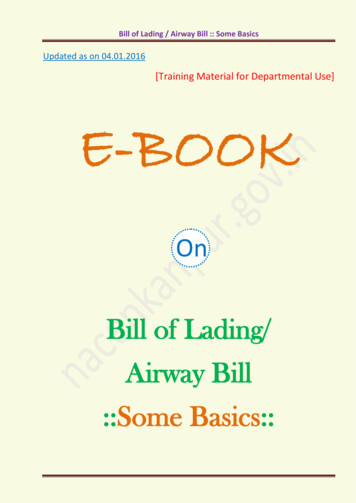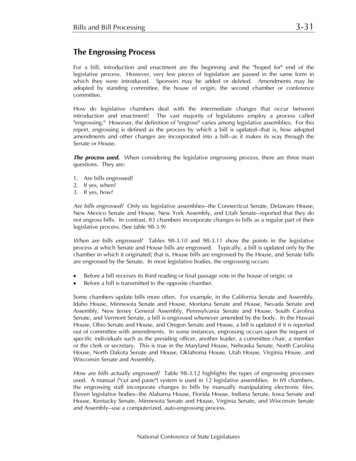
Transcription
AMENDED IN ASSEMBLY SEPTEMBER 3, 2015AMENDED IN ASSEMBLY SEPTEMBER 3, 2015california legislature—2015–16 second extraordinary sessionASSEMBLY BILLNo. 15Introduced by Assembly Members Eggman, Alejo, and Mark Stone(Principal coauthor: Assembly Member Bonta)(Principal coauthors: Senators Monning and Wolk)(Coauthors: Assembly Members Atkins, Burke, Chiu, Chu, Cooper,Frazier, Cristina Garcia, Jones-Sawyer, Low, McCarty, Perea,Quirk, and Rendon)(Coauthors: Senators Allen, Block, De León, Glazer, Hall, Hancock,Hernandez, Hertzberg, Hill, Jackson, Leno, McGuire, Mitchell, andWieckowski)August 17, 2015An act to add and repeal Part 1.85 (commencing with Section 443)to of Division 1 of the Health and Safety Code, relating to end of life.legislative counsel’s digestAB 15, as amended, Eggman. End of life.Existing law authorizes an adult to give an individual health careinstruction and to appoint an attorney to make health care decisions forthat individual in the event of his or her incapacity pursuant to a powerof attorney for health care.This bill, until January 1, 2026, would enact the End of Life OptionAct authorizing an adult who meets certain qualifications, and who hasbeen determined by his or her attending physician to be suffering froma terminal disease, as defined, to make a request for a drug prescribedpursuant to these provisions for the purpose of ending his or her life. 97
AB 15—2—The bill would establish the procedures for making these requests. Thebill would also establish the specified forms to request an aid-in-dyingdrug and, under specified circumstances, an interpreter declaration tobe signed subject to penalty of perjury, thereby creating a crime andimposing a state-mandated local program, and a final attestation foran aid-in-dying drug. This bill would require specified information tobe documented in the individual’s medical record, including, amongother things, all oral and written requests for an aid-in-dying drug.This bill would prohibit a provision in a contract, will, or otheragreement from being conditioned upon, or affected by, a person makingor rescinding a request for the above-described drug. The bill wouldprohibit the sale, procurement, or issuance of any life, health, or annuitypolicy, health care service plan contract, or health benefit plan, or therate charged for any policy or plan contract, from being conditionedupon or affected by the request. The bill would prohibit an insurancecarrier from providing any information in communications made to anindividual about the availability of an aid-in-dying drug absent a requestby the individual or his or her attending physician at the behest of theindividual. The bill would also prohibit any communication fromcontaining both the denial of treatment and information as to theavailability of aid-in-dying drug coverage.This bill would provide a person, except as provided, immunity fromcivil, criminal, administrative, employment, or contractual liability orprofessional disciplinary action for participating in good faithcompliance with the act, civil or criminal liability solely because theperson was present when the qualified individual self-administered thedrug, or the person assisted the qualified individual by preparing theaid-in-dying drug so long as the person did not assist with the ingestionof the drug, and would specify that the immunities and prohibitions onsanctions of a health care provider are solely reserved for conduct of ahealth care provider provided for by the bill. The bill would makeparticipation in activities authorized pursuant to its provisions voluntary,and would make health care providers immune from liability for refusingto engage in activities authorized pursuant to its provisions. The billwould also authorize a health care provider to prohibit its employees,independent contractors, or other persons or entities, including otherhealth care providers, from participating in activities under the act whileon the premises owned or under the management or direct control ofthat prohibiting health care provider, or while acting within the course 97
—3—AB 15and scope of any employment by, or contract with, the prohibiting healthcare provider.This bill would make it a felony to knowingly alter or forge a requestfor drugs to end an individual’s life without his or her authorization orto conceal or destroy a withdrawal or rescission of a request for a drug,if it is done with the intent or effect of causing the individual’s death.The bill would make it a felony to knowingly coerce or exert undueinfluence on an individual to request a drug for the purpose of endinghis or her life or life, to destroy a withdrawal or rescission of a request.request, or to administer an aid-in-dying drug to an individual withouttheir knowledge or consent. By creating a new crime, the bill wouldimpose a state-mandated local program. The bill would provide thatnothing in its provisions is to be construed to authorize ending a patient’slife by lethal injection, mercy killing, or active euthanasia, and wouldprovide that action taken in accordance with the act shall not constitute,among other things, suicide or homicide.This bill would require physicians to submit specified forms andinformation to the State Department of Public Health after writing aprescription for an aid-in-dying drug and after the death of an individualwho requested an aid-in-dying drug. The bill would authorize theMedical Board of California to update those forms and would requirethe State Department of Public Health to publish the forms on its InternetWeb site. The bill would require the department to annually review asample of certain information and records, make a statistical report ofthe information collected, and post that report to its Internet Web site.Existing constitutional provisions require that a statute that limits theright of access to the meetings of public bodies or the writings of publicofficials and agencies be adopted with findings demonstrating theinterest protected by the limitation and the need for protecting thatinterest.This bill would make legislative findings to that effect.The California Constitution requires the state to reimburse localagencies and school districts for certain costs mandated by the state.Statutory provisions establish procedures for making that reimbursement.This bill would provide that no reimbursement is required by this actfor a specified reason.Vote: majority. Appropriation: no. Fiscal committee: yes.State-mandated local program: yes. 97
AB 15—4—The people of the State of California do enact as follows:line 1line 2line 3line 4line 5line 6line 7line 8line 9line 10line 11line 12line 13line 14line 15line 16line 17line 18line 19line 20line 21line 22line 23line 24line 25line 26line 27line 28line 29line 30line 31line 32line 33line 34line 35line 36line 37line 38 SECTION 1. Part 1.85 (commencing with Section 443) isadded to Division 1 of the Health and Safety Code, to read:PART 1.85. END OF LIFE OPTION ACT443. This part shall be known and may be cited as the End ofLife Option Act.443.1. As used in this part, the following definitions shall apply:(a) “Adult” means an individual 18 years of age or older.(b) “Aid-in-dying drug” means a drug determined and prescribedby a physician for a qualified individual, which the qualifiedindividual may choose to self-administer to bring about his or herdeath due to a terminal disease.(c) “Attending physician” means the physician who has primaryresponsibility for the health care of an individual and treatment ofthe individual’s terminal disease.(d) “Attending physician checklist and compliance form” meansa form, as described in Section 443.22, identifying each and everyrequirement that must be fulfilled by an attending physician to bein good faith compliance with this part should the attendingphysician choose to participate.(e) “Capacity to make medical decisions” means that, in theopinion of an individual’s attending physician, consultingphysician, psychiatrist, or psychologist, pursuant to Section 4609of the Probate Code, the individual has the ability to understandthe nature and consequences of a health care decision, the abilityto understand its significant benefits, risks, and alternatives, andthe ability to make and communicate an informed decision to healthcare providers, including communication through a person familiarwith the individual’s manner of communicating, if that person isavailable. providers.(f) “Consulting physician” means a physician who isindependent from the attending physician and who is qualified byspecialty or experience to make a professional diagnosis andprognosis regarding an individual’s terminal disease.(g) “Department” means the State Department of Public Health.(h) “Health care provider” or “provider of health care” meansany person licensed or certified pursuant to Division 297
—5—line 1line 2line 3line 4line 5line 6line 7line 8line 9line 10line 11line 12line 13line 14line 15line 16line 17line 18line19line 20line 21line 22line 23line 24line 25line 26line 27line 28line 29line 30line 31line 32line 33line 34line 35line 36line 37line 38line 39line 40 AB 15(commencing with Section 500) of the Business and ProfessionsCode; any person licensed pursuant to the Osteopathic InitiativeAct or the Chiropractic Initiative Act; any person certified pursuantto Division 2.5 (commencing with Section 1797) of this code; andany clinic, health dispensary, or health facility licensed pursuantto Division 2 (commencing with Section 1200) of this code.(i) “Informed decision” means a decision by an individual witha terminal disease to request and obtain a prescription for a drugthat the individual may self-administer to end the individual’s life,that is based on an understanding and acknowledgment of therelevant facts, and that is made after being fully informed by theattending physician of all of the following:(1) The individual’s medical diagnosis and prognosis.(2) The potential risks associated with taking the drug to beprescribed.(3) The probable result of taking the drug to be prescribed.(4) The possibility that the individual may choose not to obtainthe drug or may obtain the drug but may decide not to ingest it.(5) The feasible alternatives or additional treatmentopportunities, including, but not limited to, comfort care, hospicecare, palliative care, and pain control.(j) “Medically confirmed” means the medical diagnosis andprognosis of the attending physician has been confirmed by aconsulting physician who has examined the individual and theindividual’s relevant medical records.(k) “Mental health specialist assessment” means one or moreconsultations between an individual and a mental health specialistfor the purpose of determining that the individual has the capacityto make medical decisions and is not suffering from impairedjudgment due to a mental disorder.(l) “Mental health specialist” means a psychiatrist or a licensedpsychologist.(m) “Physician” means a doctor of medicine or osteopathycurrently licensed to practice medicine in this state.(n) “Public place” means any street, alley, park, public building,any place of business or assembly open to or frequented by thepublic, and any other place that is open to the public view, or towhich the public has access.(o) “Qualified individual” means an adult who has the capacityto make medical decisions, is a resident of California, and has97
AB 15—6—line 1 satisfied the requirements of this part in order to obtain aline 2 prescription for a drug to end his or her life.line 3(p) “Self-administer” means a qualified individual’s affirmative,line 4 conscious, and physical act of administering and ingesting theline 5 aid-in-dying drug to bring about his or her own death.line 6(q) “Terminal disease” means an incurable and irreversibleline 7 disease that has been medically confirmed and will, withinline 8 reasonable medical judgment, result in death within six months.line 9443.2. (a) An individual who is an adult with the capacity toline 10 make medical decisions and with a terminal disease may make aline 11 request to receive a prescription for an aid-in-dying drug if all ofline 12 the following conditions are satisfied:line 13(1) The individual’s attending physician has diagnosed theline 14 individual with a terminal disease.line 15(2) The individual has voluntarily expressed the wish to receiveline 16 a prescription for an aid-in-dying drug.line 17(3) The individual is a resident of California and is able toline 18 establish residency through any of the following means:line 19(A) Possession of a California driver license or otherline 20 identification issued by the State of California.line 21(B) Registration to vote in California.line 22(C) Evidence that the person owns or leases property inline 23 California.line 24(D) Filing of a California tax return for the most recent tax year.line 25(4) The individual documents his or her request pursuant to theline 26 requirements set forth in Section 443.3.line 27(5) The individual has the physical and mental ability toline 28 self-administer the aid-in-dying drug.line 29(b) A person shall not be considered a “qualified individual”line 30 under the provisions of this part solely because of age or disability.line 31(c) A request for a prescription for an aid-in-dying drug underline 32 this part shall be made solely and directly by the individualline 33 diagnosed with the terminal disease and shall not be made on behalfline 34 of the patient, including, but not limited to, through a power ofline 35 attorney, an advance health care directive, a conservator, healthline 36 care agent, surrogate, or any other legally recognized health careline 37 decisionmaker.line 38443.3. (a) An individual seeking to obtain a prescription forline 39 an aid-in-dying drug pursuant to this part shall submit two oralline 40 requests, a minimum of 15 days apart, and a written request to his 97
—7—line 1line 2line 3line 4line 5line 6line 7line 8line 9line 10line 11line 12line 13line 14line 15line 16line 17line 18line 19line 20line 21line 22line 23line 24line 25line 26line 27line 28line 29line 30line 31line 32line 33line 34line 35line 36line 37line 38line 39line 40 AB 15or her attending physician. The attending physician shall directly,and not through a designee, receive all three requests requiredpursuant to this section.(b) A valid written request for an aid-in-dying drug undersubdivision (a) shall meet all of the following conditions:(1) The request shall be in the form described in Section 443.11.(2) The request shall be signed and dated, in the presence oftwo witnesses, by the individual seeking the aid-in-dying drug.(3) The request shall be witnessed by at least two other adultpersons who, in the presence of the individual, shall attest that tothe best of their knowledge and belief the individual is all of thefollowing:(A) An individual who is personally known to them or hasprovided proof of identity.(B) An individual who voluntarily signed this request in theirpresence.(C) An individual whom they believe to be of sound mind andnot under duress, fraud, or undue influence.(D) Not an individual for whom either of them is the attendingphysician, consulting physician, or mental health specialist.(c) Only one of the two witnesses at the time the written requestis signed may:(1) Be related to the qualified individual by blood, marriage,registered domestic partnership, or adoption or be entitled to aportion of the individual’s estate upon death.(2) Own, operate, or be employed at a health care facility wherethe individual is receiving medical treatment or resides.(d) The attending physician, consulting physician, or mentalhealth specialist of the individual shall not be one of the witnessesrequired pursuant to paragraph (3) of subdivision (b).443.4. (a) An individual may at any time withdraw or rescindhis or her request for an aid-in-dying drug, or decide not to ingestan aid-in-dying drug, without regard to the individual’s mentalstate.(b) A prescription for an aid-in-dying drug provided under thispart may not be written without the attending physician directly,and not through a designee, offering the individual an opportunityto withdraw or rescind the request.443.5. (a) Before prescribing an aid-in-dying drug, theattending physician shall do all of the following:97
AB 15—8—line 1(1) Make the initial determination of all of the following:line 2(A) (i) Whether the requesting adult has the capacity to makeline 3 medical decisions.line 4(ii) If there are indications of a mental disorder, the physicianline 5 shall refer the individual for a mental health specialist assessment.line 6(iii) If a mental health specialist assessment referral is made,line 7 no aid-in-dying drugs shall be prescribed until the mental healthline 8 specialist determines that the individual has the capacity to makeline 9 medical decisions and is not suffering from impaired judgmentline 10 due to a mental disorder.line 11(B) Whether the requesting adult has a terminal disease.line 12(C) Whether the requesting adult has voluntarily made theline 13 request for an aid-in-dying drug pursuant to Sections 443.2 andline 14 443.3.line 15(D) Whether the requesting adult is a qualified individualline 16 pursuant to subdivision (o) of Section 443.1.line 17(2) Confirm that the individual is making an informed decisionline 18 by discussing with him or her all of the following:line 19(A) His or her medical diagnosis and prognosis.line 20(B) The potential risks associated with ingesting the requestedline 21 aid-in-dying drug.line 22(C) The probable result of ingesting the aid-in-dying drug.line 23(D) The possibility that he or she may choose to obtain theline 24 aid-in-dying drug but not take it.line 25(E) The feasible alternatives or additional treatment options,line 26 including, but not limited to, comfort care, hospice care, palliativeline 27 care, and pain control.line 28(3) Refer the individual to a consulting physician for medicalline 29 confirmation of the diagnosis and prognosis, and for aline 30 determination that the individual has the capacity to make medicalline 31 decisions and has complied with the provisions of this part.line 32(4) Confirm that the qualified individual’s request does not ariseline 33 from coercion or undue influence by another person by discussingline 34 with the qualified individual, outside of the presence of any otherline 35 persons, except for an interpreter as required pursuant to this part,line 36 whether or not the qualified individual is feeling coerced or undulyline 37 influenced by another person.line 38(5) Counsel the qualified individual about the importance of allline 39 of the following: 97
—9—line 1line 2line 3line 4line 5line 6line 7line 8line 9line 10line 11line 12line 13line 14line 15line 16line 17line 18line 19line 20line 21line 22line 23line 24line 25line 26line 27line 28line 29line 30line 31line 32line 33line 34line 35line 36line 37line 38line 39 AB 15(A) Having another person present when he or she ingests theaid-in-dying drug prescribed pursuant to this part.(B) Not ingesting the aid-in-dying drug in a public place.(C) Notifying the next of kin of his or her request for anaid-in-dying drug. A qualified individual who declines or is unableto notify next of kin shall not have his or her request denied forthat reason.(D) Participating in a hospice program.(E) Maintaining the aid-in-dying drug in a safe and securelocation until the time that the qualified individual will ingest it.(6) Inform the individual that he or she may withdraw or rescindthe request for an aid-in-dying drug at any time and in any manner.(7) Offer the individual an opportunity to withdraw or rescindthe request for an aid-in-dying drug before prescribing theaid-in-dying drug.(8) Verify, immediately before writing the prescription for anaid-in-dying drug, that the qualified individual is making aninformed decision.(9) Confirm that all requirements are met and all appropriatesteps are carried out in accordance with this part before writing aprescription for an aid-in-dying drug.(10) Fulfill the record documentation required under Sections443.8 and 443.19.(11) Complete the attending physician checklist and complianceform, as described in Section 443.22, include it and the consultingphysician compliance form in the individual’s medical record, andsubmit both forms to the State Department of Public Health.(12) Give the qualified individual the final attestation form,with the instruction that the form be filled out and executed by thequalified individual within 48 hours prior to the qualifiedindividual choosing to self-administer the aid-in-dying drug.(b) If the conditions set forth in subdivision (a) are satisfied,the attending physician may deliver the aid-in-dying drug in anyof the following ways:(1) Dispensing the aid-in-dying drug directly, including ancillarymedication intended to minimize the qualified individual’sdiscomfort, if the attending physician meets all of the followingcriteria:(A) Is authorized to dispense medicine under California law.97
AB 15line1line 2line 3line 4line 5line 6line 7line 8line 9line 10line 11line 12line 13line 14line 15line 16line 17line 18line 19line 20line 21line 22line 23line 24line 25line 26line 27line 28line 29line 30line 31line 32line 33line 34line 35line 36line 37line 38line 39line 40 — 10 —(B) Has a current United States Drug EnforcementAdministration (USDEA) certificate.(C) Complies with any applicable administrative rule orregulation.(2) With the qualified individual’s written consent, contactinga pharmacist, informing the pharmacist of the prescriptions, anddelivering the written prescriptions personally, by mail, orelectronically to the pharmacist, who may dispense the drug to thequalified individual, the attending physician, or a person expresslydesignated by the qualified individual and with the designationdelivered to the pharmacist in writing or verbally.(c) Delivery of the dispensed drug to the qualified individual,the attending physician, or a person expressly designated by thequalified individual may be made by personal delivery, or, with asignature required on delivery, by United Parcel Service, UnitedStates Postal Service, Federal Express, or by messenger service.443.6. Before a qualified individual obtains an aid-in-dyingdrug from the attending physician, the consulting physician shallperform all of the following:(a) Examine the individual and his or her relevant medicalrecords.(b) Confirm in writing the attending physician’s diagnosis andprognosis.(c) Determine that the individual has the capacity to makemedical decisions, is acting voluntarily, and has made an informeddecision.(d) If there are indications of a mental disorder, refer theindividual for a mental health specialist assessment.(e) Fulfill the record documentation required under this part.(f) Submit the compliance form to the attending physician.443.7. Upon referral from the attending or consulting physicianpursuant to this part, the mental health specialist shall:(a) Examine the qualified individual and his or her relevantmedical records.(b) Determine that the individual has the mental capacity tomake medical decisions, act voluntarily, and make an informeddecision.(c) Determine that the individual is not suffering from impairedjudgment due to a mental disorder.(d) Fulfill the record documentation requirements of this part.97
— 11 —line 1line 2line 3line 4line 5line 6line 7line 8line 9line 10line 11line 12line 13line 14line 15line 16line 17line 18line 19line 20line 21line 22line 23line 24line 25line 26line 27line 28line 29line 30line 31line 32line 33line 34line 35line 36line 37line 38line 39line 40 AB 15443.8. All of the following shall be documented in theindividual’s medical record:(a) All oral requests for aid-in-dying drugs.(b) All written requests for aid-in-dying drugs.(c) The attending physician’s diagnosis and prognosis, and thedetermination that a qualified individual has the capacity to makemedical decisions, is acting voluntarily, and has made an informeddecision, or that the attending physician has determined that theindividual is not a qualified individual.(d) The consulting physician’s diagnosis and prognosis, andverification that the qualified individual has the capacity to makemedical decisions, is acting voluntarily, and has made an informeddecision, or that the consulting physician has determined that theindividual is not a qualified individual.(e) A report of the outcome and determinations made during amental health specialist’s assessment, if performed.(f) The attending physician’s offer to the qualified individualto withdraw or rescind his or her request at the time of theindividual’s second oral request.(g) A note by the attending physician indicating that allrequirements under Sections 443.5 and 443.6 have been met andindicating the steps taken to carry out the request, including anotation of the aid-in-dying drug prescribed.443.9. (a) Within 30 calendar days of writing a prescriptionfor an aid-in-dying drug, the attending physician shall submit tothe State Department of Public Health a copy of the qualifyingpatient’s written request, the attending physician checklist andcompliance form, and the consulting physician compliance form.(b) Within 30 calendar days following the qualified individual’sdeath from ingesting the aid-in-dying drug, or any other cause, theattending physician shall submit the attending physician followupform to the State Department of Public Health.443.10. A qualified individual may not receive a prescriptionfor an aid-in-dying drug pursuant to this part unless he or she hasmade an informed decision. Immediately before writing aprescription for an aid-in-dying drug under this part, the attendingphysician shall verify that the individual is making an informeddecision.443.11. (a) A request for an aid-in-dying drug as authorizedby this part shall be in the following form:97
AB 15line 1line 2line 3line 4line 5line 6line 7line 8line 9line 10line 11line 12line 13line 14line 15line 16line 17line 18line 19line 20line 21line 22line 23line 24line 25line 26line 27line 28line 29line 30line 31line 32line 33line 34line 35line 36line 37line 38line 39 — 12 —REQUEST FOR AN AID-IN-DYING DRUG TO END MY LIFE IN AHUMANE AND DIGNIFIED MANNER I, .,am an adult of sound mind and a resident of the State of California.I am suffering from ., which my attending physician has determinedis in its terminal phase and which has been medically confirmed.I have been fully informed of my diagnosis and prognosis, the nature of theaid-in-dying drug to be prescribed and potential associated risks, the expectedresult, and the feasible alternatives or additional treatment options, includingcomfort care, hospice care, palliative care, and pain control.I request that my attending physician prescribe an aid-in-dying drug that willend my life in a humane and dignified manner if I choose to take it, and Iauthorize my attending physician to contact any pharmacist about my request.INITIAL ONE:. I have informed one or more members of my family of my decisionand taken their opinions into consideration. I have decided not to inform my family of my decision. I have no family to inform of my decision.I understand that I have the right to withdraw or rescind this request at anytime.I understand the full import of this request and I expect to die if I take theaid-in-dying drug to be prescribed. My attending physician has counseled meabout the possibility that my death may not be immediately upon theconsumption of the drug.I make this request voluntarily, without reservation, and without being coerced.Signed:.Dated:.DECLARATION OF WITNESSESWe declare that the person signing this request:(a) is personally known to us or has provided proof of identity;(b) voluntarily signed this request in our presence;(c) is an individual whom we believe to be of sound mind and not under duress,fraud, or undue influence; and(d) is not an individual for whom either of us is the attending physician,consulting physician, or mental health specialist.Witness 1/Date.Witness 2/Date97
— 13 —line 1line 2line 3line 4line 5line 6line 7line 8line 9line 10line 11line 12line 13line 14line 15line 16line 17line 18line 19line 20line 21line 22line 23line 24line 25line 26line 27line 28line 29line 30line 31line 32line 33line 34line 35line 36line 37line 38line 39line 40 AB 15NOTE: Only one of the two witnesses may be a relative (by blood, marriage,registered domestic partnership, or adoption) of the person signing this requestor be entitled to a portion of the person’s estate upon death. Only one of thetwo witnesses may own, operate, or be employed at a health care facility wherethe person is a patient or resident.(b) (1) The written language of the request shall be written inthe same translated language as any conversations, consultations,or interpreted conversations or consultations between a patient andhis or her attending or consulting physicians.(2) Notwithstanding paragraph (1), the written request may beprepared in English even when the conversations or consultationsor interpreted conversations or consultations were conducted in alanguage other than English if the English language form includesan attached interpreter’s declaration that is signed under penaltyof perjury. The interpreter’s declaration shall state words to theeffect that:I, (INSERT NAME OF INTERPRETER), am fluent in English and (INSERTTARGET LANGUAGE).On (insert date) at approximately (insert time), I read the “Request for anAid-In-Dying Drug to End My Life” to (insert name of individual/patient) in(insert target language).Mr./Ms. (insert name of
who requested an aid-in-dying drug. The bill would authorize the Medical Board of California to update those forms and would require the State Department of Public Health to publish the forms on its Internet Web site. The bill would require the department to annually review a sample of certain information and records, make a statistical report of
